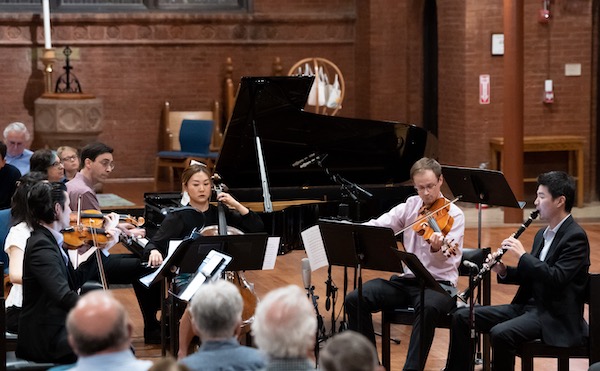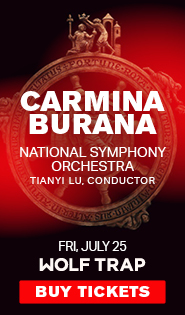Chiarina opens season with slenderized concertos by Mozart, Beethoven

The Chiarina Chamber Players performed Prokofiev’s Overture on Hebrew Themes Sunday at St. Mark’s on Capital Hill. Photo: Benjamin Scott
Why bother with chamber transcriptions of concertos when you can listen to a recording of the real thing any time you want?
The Chiarina Chamber Players’ concert on Sunday night at St. Mark’s on Capitol Hill endeavored to “highlight the chamber qualities of two solo concerti,” as Chiarina co-founder Carrie Bean Stute said during a concert introduction. One of the transcriptions made the concerto into a chamber work with mixed success; the other recreated the orchestral dynamic with fewer players, and made for a good time.
In assembling musicians for Sunday’s concert, Chiarina drew heavily on the National Symphony Orchestra. Joining pianist Efi Hackmey, the other Chiarina co-founder, were Lin Ma, the NSO’s principal clarinet, as well as NSO violinists Wanzhen Li and Derek Powell, cellist Eugena Chang, and bassist Richard Barber. Violist Philip Kramp, who rounded out the ensemble, frequently performs with the NSO among his other endeavors.
Before the concertos, everyone but Barber got to perform in the original instrumentation of Sergei Prokofiev’s Overture on Hebrew Themes, a romp through traditional Jewish folk tunes, well timed for Rosh Hashanah. Rhythmic attacks could have been more incisive, but Ma’s clarinet danced winningly through the opening klezmer tune, Chang’s cello offered arresting melodic moments, and the performance captured the mercurial yet affectionate tone of the work.
A transcription of Wolfgang Amadeus Mozart’s Clarinet Concerto by contemporary composer Michael Drapkin followed, and Ma’s playing made the best possible case for hearing it. His tone shimmered with golden and amber hues, especially in the slow movement’s aching lyrical theme. In faster moments he played with a rhythmic grace and nimble articulation that never failed to delight.
Unfortunately, Drapkin’s transcription suffers in comparison to the quintet Mozart actually wrote for clarinet and string quartet, which (unlike this transcription) does not awkwardly begin with a few minutes of the strings playing all the themes while the clarinet sits waiting its turn. Besides questions of form, it seems Mozart put the material suited for orchestra into the concerto; one missed the colors in previously orchestral passages, and string textures often felt thin. (Drapkin originally wrote his transcription for clarinet and string quartet; the program did not explain why and how Barber’s bass was added, but it didn’t help much.)
In the second movement, with Ma playing that aching melody at an intimate whisper over the quiet strings, the transcription seemed to momentarily shine a new light on this music. Otherwise, Mozart’s first thoughts on instrumentation remained unchallenged, despite Ma’s outstanding playing.
In Vinzenz Lachner’s 19th-century transcription of Ludwig van Beethoven’s Piano Concerto No. 1, the ensemble played with bite and energy sufficient to convey the force of a full orchestra from the opening chords. Hackmey, taking the soloist role along with the strings used in the Mozart, played at a lower volume that he presumably would have in an orchestral setting, but the performance still emerged bigger and more satisfying than the Mozart, with a first movement that felt lively throughout and a keenly expressive Largo movement.
Hackmey took the Rondo finale’s theme a little faster than he could comfortably play it at first, but the closing pages of the concerto — the surprise modulation up to the distant key of B major, the leisurely wending back towards C major, the fake slow ending and the final orchestral barrage — all had terrific concentration and hand-in-glove playing from Hackmey and his colleagues. Here, thoughts about instrumentation fell away as Beethoven’s music blossomed.
The Chiarina Chamber Players present the Aizuri Quartet playing Brahms, Bartók, and Clara Schumann, on October 22. chiarina.org


